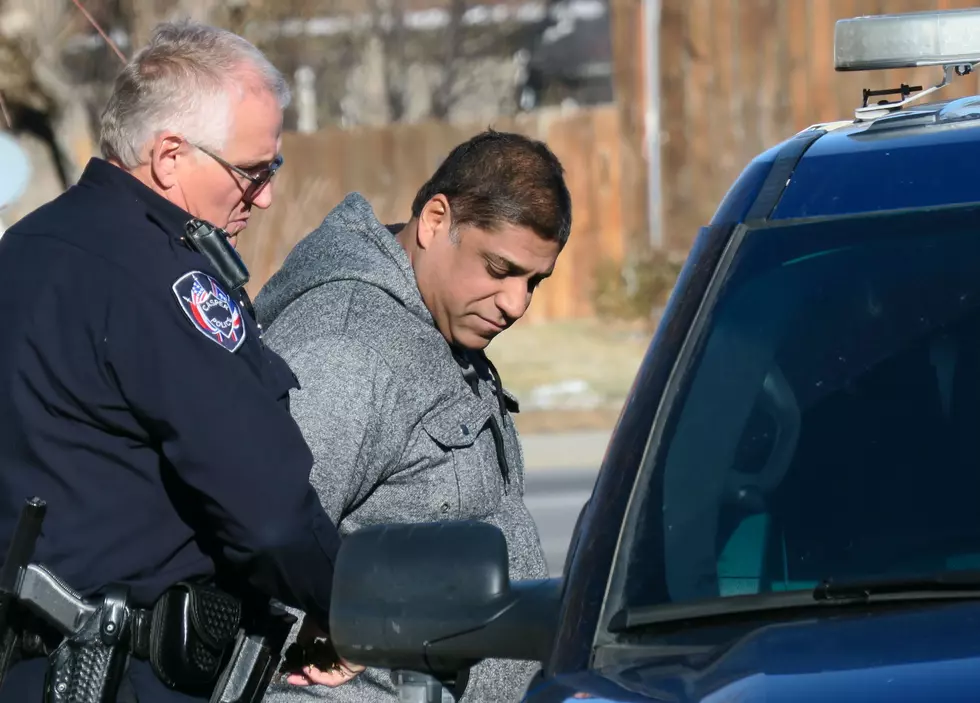
Former Casper Doctor Questioned About Prescriptions Without Visits
Former Dr. Shakeel Kahn, charged with operating a multi-state prescription drug conspiracy, doesn't much like pharmacists, the U.S. Drug Enforcement Administration, some of his former patients, some of the rules he was supposed to follow, and especially the way a prosecutor questioned him on the 16th day of the trial in federal court in Casper.
Kahn repeatedly denied that he prescribed opioids and other pain medications outside the standard of care, even though some patients said otherwise during previous testimony, during cross-examination by Assistant U.S. Attorney Stephanie Sprecher.
"We also heard it from a bunch of liars," Kahn said.
Monday afternoon, the defense rested. The jury will return at 9:30 a.m., after which U.S. District Court Judge Alan Johnson will read the jury instructions and the attorneys will present their closing arguments. The jury will then begin their deliberations about Shakeel Kahn and his brother Nabeel Kahn.
The federal government has charged Shakeel Kahn with prescribing controlled substances outside the standard of care resulting in death, operating a continuing criminal enterprise, having a firearm during a drug crime, money laundering, and using a telephone for a criminal purpose.
If convicted on all counts, he faces 45 years to life imprisonment.
If Nabeel Kahn [sometimes spelled Khan] is convicted of the charges -- distributing oxycodone and other drugs resulting in death and brandishing a firearm during a drug trafficking crime -- against him, he faces a minimum of 27 years to life imprisonment.
Monday morning, Kahn admitted that he did not keep good records of visits, and often copied and pasted notes from previous patient visits on more recent visits.
But Sprecher said some of those visits never happened even though patients received prescriptions without being examined or questioned about their health.
For example, she recounted the testimony of one patient who testified for the prosecution who said he would go to Kahn's office in Fort Mohave, Ariz., would meet someone in the office and maybe had his vital signs taken, pay the fee for the visit and receive the prescription.
Kahn would later create a chart describing the visit, but denied that his actions were outside the standard of care. He added that it wasn't inappropriate because that person had been a long-time patient.
Kahn also had no reason to believe that the patient was addicted to opioids, he said.
Sprecher also noted the chart of a woman who later died of an overdose.
According to Kahn's records, he examined her pelvic area during one visit, but did not note that she was pregnant.
That woman had a baby a month later, Sprecher said.
Throughout questioning by her and his defense attorneys, Kahn insisted he never knowingly prescribed opioids to anyone who was abusing them or selling them.
Sprecher focused on his self-admitted sloppy record-keeping, and how in 2015 he and his wife pulled up patient records from several years before that to add information before sending them to the Arizona Board of Medicine during an investigation.
"I didn't falsify records, I corrected them," Kahn said.
A chart for one patient, Sprecher said, did not indicate that he had taken a urine drug screening, but the revised one did.
"It would have been false not to mention it," Kahn said.
Yet the revised one also listed a specific date for that test, but he admitted he didn't know if the test really was performed on that date.
Many of his records had copied-and-pasted notes from previous charts.
During her afternoon cross-examination, she said he supplied drugs to people, to which he retorted, "I don't supply drugs, I supply medical services."
Sprecher also goaded him with comments such as calling his patients "customers."
She also asked him about writing to a state board of pharmacy to criticize pharmacists who refused to fill prescriptions he wrote, saying they were jeopardizing patient care.
Kahn didn't like pharmacists, saying they did not work with patients, he added.
Sprecher also asked him about an incident when brother Nabeel had an infection in his foot that was spreading to his leg and he could have died.
Shakeel Kahn and his wife Lyn drove Nabeel from Fort Mohave, Ariz., to a hospital in Las Vegas. There, Shakeel he used his driver's license for Nabeel's identification, and used his health insurance to cover for the $314,000 bill after a month-long stay at the hospital.
When Sprecher told him that he had more than $1 million in cash at his home that could have covered those expenses, he said that he realized that later adding he didn't think either the hospital or insurance company would find out.
Later, Shakeel wrote prescriptions to his stepdaughter Shaina Voss for pain medication for Nabeel.
While that illegal, it was for a legitimate medical purpose, he said. "There are exceptions to every law."
Sprecher pointed to some guidelines from the DEA about opioid treatment, to which Kahn responded that it doesn't deal with medicine and his disagreements with its guidelines are why the trial is happening.
"I don't pay attention to the DEA particularly," he said.
The attitude about the DEA illustrated Kahn's perspective on treatment.
Sprecher questioned his aggressive approach of prescribing highly addictive drugs, but Kahn responded that is what some patients needed because their previous treatments of lower doses didn't work.
Defense attorneys Sean Barrett and Michael Thompson continued that line of questioning, with Kahn saying that he wanted to do the best for his patients by prescribing what was necessary to effectively treat pain so they could get on with their lives.
Kahn also defended not always requiring an exam for every office visit by patients because he'd known some of them and trusted them.
However, it was only later that he learned that they lied to him and deceived him about abusing their medicines or selling them, he said.
More From K2 Radio









